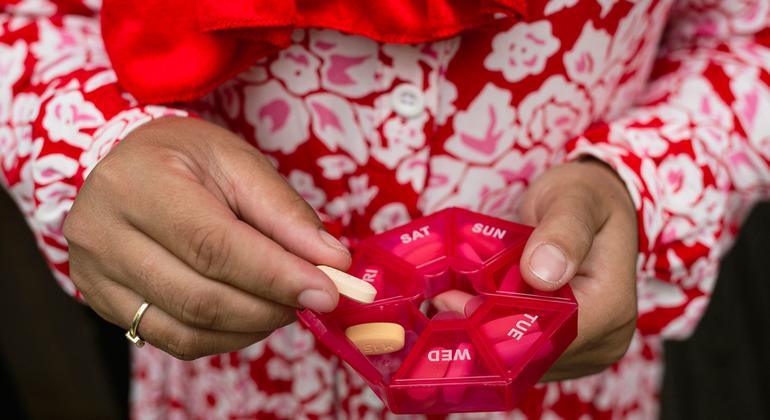Launching its report on World AIDS Day 2025, Overcoming disruption, transforming the AIDS responseUNAIDS said international aid had fallen sharply, with OECD projections showing external health financing could decline 30 to 40 percent in 2025 compared to 2023.
The impact was immediate and severe, particularly in low- and middle-income countries heavily affected by HIV.
“The funding crisis has exposed the fragility of the progress we have fought so hard for,” said Winnie Byanyima, executive director of UNAIDS, speaking in Geneva.
“Behind every data point in this report are people…babies missed for HIV testing, young women cut off from prevention support, and communities suddenly left without services and care. We cannot abandon them.”
Prevention services hardest hit
UNAIDS reports widespread disruption to HIV prevention, testing and community programs:
- In 13 countries, the number of people newly started on treatment decreased.
- Stock shortages of HIV testing kits and essential medicines have been reported in Ethiopia and the Democratic Republic of Congo.
- Distribution of preventive drugs has fallen 31 percent in Uganda, 21 percent in Viet NamAnd 64 percent in Burundi.
- 450,000 women in sub-Saharan Africa lost access to “mentor mothers,” trusted community workers who connect them to care.
- Nigeria recorded a 55 percent drop in the distribution of condoms.
Before the crisis, adolescent girls and young women were already hard hit. 570 new HIV infections occur every day in young women aged 15 to 24. UNAIDS warns that dismantling prevention programs makes them even more vulnerable.
Community organizations, which form the backbone of HIV awareness, are also under pressure. On 60 percent of organizations led by women say they have had to suspend essential services.
UNAIDS modeling now suggests that failure to restore prevention efforts could lead to a 3.3 million additional new HIV infections between 2025 and 2030.
Human rights reversals compound risks
The funding crisis develops against a backdrop of growing restrictions on civil society and an increase in punitive laws targeting marginalized groups most affected by HIV.
For the first time since UNAIDS began tracking such legislation, the number of countries criminalizing same-sex relations and gender expression increased in 2025. Globally:
- 168 countries criminalize certain aspects of sex work
- 152 criminalize small-scale drug possession
- 64 criminalize homosexual relations
- 14 criminalize transgender people
Restrictions on civil society, including onerous registration rules and limits on obtaining international assistance, further undermine access to services.
Zimbabwe: “People have not stopped needing services – they no longer have access to them”
Speaking from Harare, Dr Byrone Chingombe, technical director of the Center for Sexual Health and HIV/AIDS Research (CeSHHAR), described the real impact of funding cuts in Zimbabwe.
“2025 was a difficult year,” he said. “When funding stopped in January, service providers were laid off overnight. The drugs were on the shelves, but the people delivering them were gone. This disrupted adherence and, more importantly, trust.”
CeSHHAR HIV testing “case finding” rates have fallen by more than 50 percenta decline which he says reflects a loss of access and not a reduction in need. Community-led teams, already overburdened, are trying to fill the void.
He highlighted two areas of hope: community resilience and new long-acting prevention technologies, including injectable lenacapavir, whose approval was recently fast-tracked in Zimbabwe and is now expected to arrive in the country in early 2026.
A woman living with HIV receives medication at a hospital in Zimbabwe.
A call to action
UNAIDS urges world leaders to:
- Reaffirming global solidarity and multilateralismincluding commitments made at the recent G20 leaders summit in South Africa
- Maintain and increase HIV fundingparticularly for countries most dependent on external aid
- Invest in innovationincluding affordable, long-acting prevention
- Defending human rights and empowering communitieswhich remain essential to the success of HIV responses
“It is our time to choose,” Ms. Byanyima said. “We can allow these shocks to undo decades of hard-won progress, or we can unite behind the shared vision of ending AIDS. Millions of lives depend on the choices we make today.”




